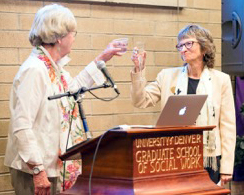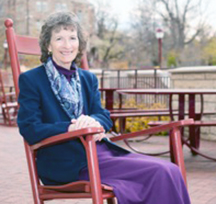Jean East: ‘My Job, My Vocation’
Posted on November 1, 2018, by Jean East CoL

Photo courtesy of Jean East
I am so blessed that my job as a professor at the University of Denver was not only my job but also my vocation. I retired in June 2018 from a position in which my job and my vocation joined to teach and mentor others, primarily young women, to work for social justice, change and compassion in our world. Loretto was very much a part of my retirement event. Sue Kenney, my longtime companion in work with and on behalf of women, spoke of our journey, the dreaming and creation of Project WISE (Women’s Initiative for Service and Empowerment) and its 20 years of making a difference. In addition, I was joined at the celebration by Beth Blissman, Martha Crawley, Anna Koop, Marty Lally, Pat McCormick, Mary Ellen McElroy, Cathy Mueller, Jeanne Orrben, Lydia Peña, Lisa Reynolds, Mary Helen Sandoval and Joan Spero.
When I first met the Sisters of Loretto I was doing my master’s in social work internship at Catholic Charities. The first Loretto member I met was Gabriel Mason. She inspired me in many ways, by the example of her work and her love for the Community. I also met Jeanne, who introduced herself to me my first day at the internship, and Sue was in my class. The rest is history. Sue and I graduated in 1979, and I became a co-member in 1983.
A few thoughts from my talk follow. These ideas are part of my professional journey and how I have come to experience Loretto:

Photo courtesy of Jean East
No one does this work alone. “It is always about the relationship” was the first principle I learned in community-organizing training. That principle was later followed by my reading and teaching the works of Margaret Wheatley, who wrote Leadership and the New Science in 1994. Writing about leadership and organizations, she links quantum physics to the significance of relationships: There really are not discreet sub-atomic parts; rather it is the energy field between the parts that is significant. It is not just that I know who you are and a little about you and you know who I am. The key is the synergy we create, and this synergy is not just with people but is with all living things, with ideas and with our emotions.
Significant for me was crafting my dissertation work. I was introduced to post-modern feminist theory. My topic about the experiences of women and poverty became the passion of my scholarship and the creation of Project WISE, a Loretto-funded work.
I started teaching in 1991, a humbling journey, and where Parker Palmer’s words, we must learn to “teach who we are,” formed my work. I participated in a Parker Palmer workshop in Grand Lake, Colo., with Loretto in 1994. We are all teachers in so many ways, and the intersection of my life with so many of my students has been the greatest gift of all.
The theme here is relationships: my friends, a family I have created, former students who make my heart sing when I hear from them and the Loretto Community that teaches me the grace of one of its principles, to listen and be modified in thought and act.
I continue my journey and my vocation. For many of us in Loretto, we are blessed that we have vocations that give our lives meaning and support the vows of working for justice and acting for peace.
I often reflect on our role in supporting hope. Bryan Stevenson says hopelessness is the enemy of justice. I believe in critical hope, knowing we have hard work to do, and it will not be easy as we continue to extend the boundaries of learning and justice. If we can do that, in big and small ways, and in the context of relationships and community, we will just keep on working to change the world. We are the ones who take action to find our hidden wholeness as social justice professionals. We do not obscure grace with technical prowess; rather we reveal as many truths as possible, truths in which the human heart can rest (Palmer, 2004).
